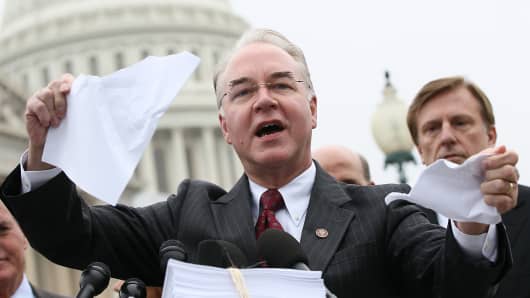
To boost their chances of repealing Obamacare, House Republicans have made their replacement plan look a bit more like Obamacare.
The plan, unveiled Monday evening by the House Ways and Means and Energy and Commerce committees, would create refundable tax credits for the purchase of insurance to replace Obamacare premiums subsidies. The tax credits would range from $2,000 per person for those in their twenties to $4,000 for those in their sixties. Like Obamacare subsidies, the tax credits would begin phasing out for incomes above $75,000 for single filers and $150,000 for couples.
Like under Obamacare, the GOP's "American Health Care Act" would assure that children could stay on their parents' health plans until age 26 and that those with pre-existing conditions must be offered coverage. To allow states to help those with pre-existing conditions who would be sure to face higher premiums under this plan, the Republican proposal would set aside $100 billion over 10 years that states could use to subsidize those high-risk, high-cost patients.
Like Obamacare, the GOP plan would preserve the so-called Cadillac tax on high-cost insurance plans provided by employers. Republicans had initially considered expanding the Cadillac tax to hit a larger number of health plans, but backed off that approach in the face of opposition.
Like Obamacare, the GOP plan would result in higher premiums for older patients than younger ones. Indeed, it would allow an even greater disparity than under Obamacare, which shifts financial burdens off younger Americans and onto older ones.
At the same time, the plan would cap the amount states could receive per-person enrolled in the joint federal-state Medicaid program. It would freeze expanded enrollment under the Obamacare Medicaid expansion as of Jan. 1, 2020, but allow those who have gained coverage under the expansion until then to stay on the program.
It is too early to assess political reaction to the GOP plan, which was just released at 6 p.m. on Monday. Republicans already faced intra-party divisions and House-Senate disagreements in addition to strong resistance from Democrats.
Nor is it possible to assess the effects of the bill on the federal budget or on the number of people who have health insurance. That's because the Congressional Budget Office and Joint Committee on Taxation have not completed their "scores" of the proposal.
Even without those scores, the Ways and Means and Energy and Commerce committees plan to begin legislative action on Wednesday.
